鲁教版八年级英语动词填空练习题
- 格式:doc
- 大小:32.00 KB
- 文档页数:2
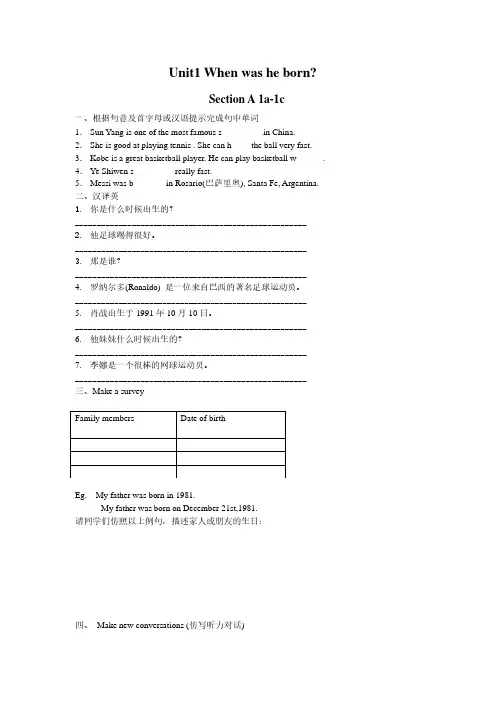
Unit1 When was he born?Section A 1a-1c一、根据句意及首字母或汉语提示完成句中单词1.Sun Yang is one of the most famous s_________ in China. 2.She is good at playing tennis . She can h____ the ball very fast. 3.Kobe is a great basketball player. He can play basketball w______. 4.Ye Shiwen s_________ really fast.5.Messi was b_______ in Rosario(巴萨里奥), Santa Fe, Argentina.二、汉译英1.你是什么时候出生的?_____________________________________________________2.他足球踢得很好。
_____________________________________________________3.那是谁?_____________________________________________________ 4.罗纳尔多(Ronaldo) 是一位来自巴西的著名足球运动员。
_____________________________________________________ 5.肖战出生于1991年10月10日。
_____________________________________________________ 6.他妹妹什么时候出生的?_____________________________________________________ 7.李娜是一个很棒的网球运动员。
_____________________________________________________ 三、Make a surveyEg.My father was born in 1981.My father was born on December 21st,1981.请同学们仿照以上例句,描述家人或朋友的生日:___________________________________________________________________________________________________________________________________________________________________________________________________________________________________________________________________________________________________________________________________________________________________________________ 四、Make new conversations (仿写听力对话)Unit1 When was he born?Section A 2a-2d一、 根据句意及首字母或汉语提示完成句中单词1. It ’s very hot today, let ’s have some i________ cream.2. I really a__________ these people with a lot of knowledge. Some doctors help people with their medical knowledge.3. That young g______ can sing some pop songs and play the guitar well.4. I think the color blue makes people feel calm, so I want to______ (刷漆)the wall blue.5. Where is the tallest________(塔)in China?二、用所给动词的适当形式填空.1. He _______ (be) not with me at that time.2. She _______(be) born in 1997.Name : Yao MingDate of birth: 1980A basketball playerA: __________________________ B: __________________________ ___________________________ A: __________________________ B: __________________________ Name : Ronaldo Date of birth: 1985 A football playerA: __________________________B: _____________________________________________________A: __________________________B: __________________________3. They ______ (go) to the park last Sunday.4. Bob was so tired that he _____(sleep) earlier than usual.5. My mother ________(give) me a present last Christmas.6. Mrs. Li _______(live) here many years ago.7. I _____(have) a good time last vacation.8. She was in a hurry, so she ____(not have) time to cook for you.三、根据课本内容, 完成下面的短文I admire this guy with great_______. He is a street artist. He ________pictures on the ground or on buildings. The pictures he paints look so ______and 3D! Although the picturesare _______,they look like they’re 3D. He started ______these pictures when he was about20 years old. He was still a_______ student. He sometimes_______ _______ _______ for painting the buildings at school!四、用When was, How long或When did 填空。
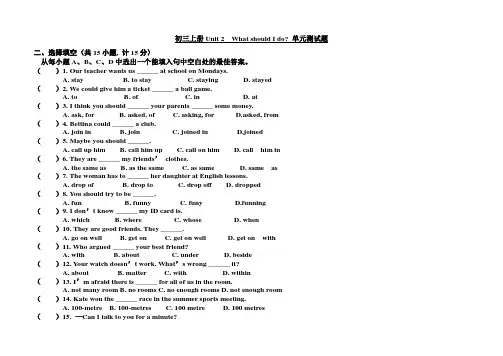
初三上册Unit 2 What should I do? 单元测试题二、选择填空(共15小题, 计15分)从每小题A、B、C、D中选出一个能填入句中空白处的最佳答案。
()1. Our teacher wants us ______ at school on Mondays.A. stayB. to stayC. stayingD. stayed()2. We could give him a ticket ______ a ball game.A. toB. ofC. inD. at()3. I think you should ______ your parents ______ some money.A. ask, forB. asked, ofC. asking, forD.asked, from()4. Bettina could ______ a club.A. join inB. joinC. joined inD.joined()5. Maybe you should ______.A. call up himB. call him upC. call on himD. call him in()6. They are ______ my friends’clothes.A. the same asB. as the sameC. as sameD. same as()7. The woman has to ______ her daughter at English lessons.A. drop ofB. drop toC. drop offD. dropped()8. You should try to be ______.A. funB. funnyC. funyD.funning()9. I don’t know ______ my ID card is.A. whichB. whereC. whoseD. when()10. They are good friends. They ______.A. go on wellB. get onC. get on wellD. get on with()11. Who argued ______ your best friend?A. withB. aboutC. underD. beside()12. Your watch doesn’t work. What’s wrong ______ it?A. aboutB. matterC. withD. within()13. I’m afraid there is ______ for all of us in the room.A. not many roomB. no roomsC. no enough roomsD. not enough room()14. Kate won the ______ race in the summer sports meeting.A. 100-metreB. 100-metresC. 100 metreD. 100 metres()15. —Can I talk to you for a minute?—Sure. I have ______ time.A. a fewB. littleC. fewD. a lit三、阅读理解(共四篇短文,20小题,计20分)先阅读短文A,B,然后选出最佳答案AFire can help people in many ways. But it can be very harmful. Fire can make water hot and the house warm, give light and cook food. But fire can burn things, too. It can make trees, houses, animals and other things catch fire(着火). If some people can’t run away from fire, it can kill them. This can be seen in every country. Sometimes big fire can burn forests and destroy(毁坏) many tall buildings.Nobody knows clearly when people began to make fire, but there are many interesting stories about the first time a man or a woman started a fire. One story from Australia tells about a man a long time ago, he went up to the sun and brought fire down.Today people know how to make a fire with matches(火柴). Children sometimes like to play with them. But matches can be very dangerous. The match can burn a piece of paper and then it can burn a house. A small fire can become a big one. Fire kills many people every year. So you must be careful with fire.( )1. The passage tells us ______.A. how people make fireB. when people make fireC. something about fireD. how to make a fire with matches( )2. Sometimes fires happen because ______.A. children like to play with matchesB. buildings, houses and other things are easy to burnC. people can’t be careful with matchesD. people should learn to use matches( )3. Matches can be very dangerous because ______.A. they might burn a houseB. matches can make something catch fireC. a match can burn a piece of paperD. fire kills many people every year( )4. Fire is very ______ sometimes.A. harmfulB. helpfulC. dangerousD. helpful and harmful( )5. Which of the following is not true?A. Fire can make houses warm and cook food.B. Everyone knows when man began to make fire.C. Fire can burn a house and kill people.D. People should learn to use fire carefully.BThirty years ago, Lake Ponkapog in Hartwell, New Jersey, was full of life. Many birds and animals lived beside the water, which was fullof fish. Now there are few birds, animals, and fish. The lake water is polluted(污染的). It is in a color of dirty brown, and it is filled with strange plants.How did this happen? First, we must think about how water gets into Lake Ponkapog. When it rains, water comes into the lake from all around. In the past, there were forests all around Lake Ponkapog, so the rainwater was clean.Now there are many homes around the lake. People often use chemicals(化学品) in their gardens. They use other chemicals inside their houses for cleaning or killing insects(昆虫). There are also many businesses. Businesses use chemicals in their machines or shops. Other chemicals fall onto the ground from cars or trucks. When it rains, the rainwater picks up all the chemicals from homes and businesses and then carries them into the lake. They pollute the water and kill the animals.Boats on the lake are also a problem. Lake Ponkapog is a popular place for motorboats. But oil and gas from boats often get into the lake. So more bad chemicals go into the water this way.People in Hartwell are worried. They love their lake and want to save it. Will it be possible? A clean lake must have clean rainwater going into it. Clean rainwater is possible only if people are more careful about chemicals at home and at work. They must also be more careful about gas and oil and other chemicals on the ground. And they mustn’t use motorboats any more on the lake. All these may change people’s lives. Only then can Lake Ponkapog be a beautiful, clean lake again.( )1. In the past, ______ made the water in Lake Ponkapog clean.A. forestsB. rainC. birdsD. fish( )2. ______ carry(carries) chemicals from homes and businesses into the lake.A. The cars and trucksB. The boatsC. Some peopleD. The rainwater( )3. Cleaner rainwater will mean _____.A. more boats on the lakeB. more dirty things in the lakeC. a cleaner lakeD. a dirtier lake( )4. To save Lake Ponkapog, people need to______.A. be more careful about chemicalsB. use less waterC. grow fewer plants in the gardenD. use more motorboats on the lake( )5. The passage is about _____.A. boats on Lake PonkapogB. why the water is dirty in Lake PonkapogC. clean rainwaterD. dirty lake先阅读短文,然后回答问题CLong, long ago there lived a poor young boy in a small village. He was about ten years old. Every afternoon, he walked around the village selling his cooking oil(油). He carried the oil in a small wooden basin(盆). After he sold all of his oil one day, he was very tired. He thought that he would take a rest. He left his wooden basin under a tree, put the money in it and then fell asleep.About two hours later, he woke up. He looked into the basin and found that his money was gone. He went at once to see a woman judge(法官). The judge listened to the boy’s story very carefully. She thought for a while, and then said to the men in her office, “Go and get all thevillage people here.” When all the village people came, she asked that everyone should put a coin(硬币) into the water in a big basin. About half the people had put their coins in before a young man came up. He also put his coin into the water.“Wait a minute,” the judge said. “You took away the boy’s money, didn’t you?”The young man’s face turned red. “Yes-yes-yes,” he said. “How did you know that?”The judge said, “You see, after you had put your coin into the water, some oil came up to the top. Your money must have been taken from the oil basin.”1.What did the poor young boy do?2. Where did the boy put his wooden basin and then fell asleep?3。
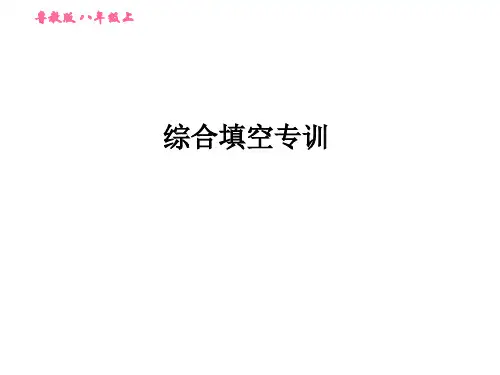
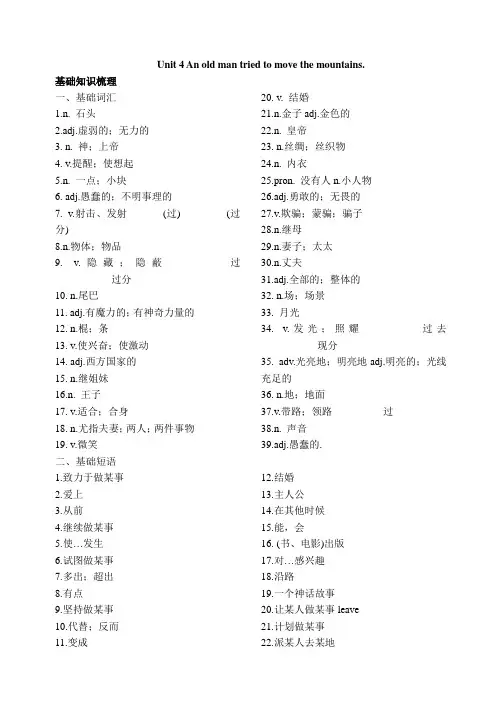
Unit 4 An old man tried to move the mountains. 基础知识梳理一、基础词汇1.n. 石头___________2.adj.虚弱的;无力的___________3. n. 神;上帝___________4. v.提醒;使想起___________5.n. 一点;小块___________6. adj.愚蠢的;不明事理的___________7. v.射击、发射_______(过)________ (过分)________8.n.物体;物品___________9. v.隐藏;隐蔽___________过___________过分___________10. n.尾巴___________11. adj.有魔力的;有神奇力量的_________12. n.棍;条___________13. v.使兴奋;使激动___________14. adj.西方国家的___________15. n.继姐妹___________16.n. 王子___________17. v.适合;合身___________18. n.尤指夫妻;两人;两件事物_________19. v.微笑___________ 20. v. 结婚___________21.n.金子adj.金色的___________22.n. 皇帝___________23. n.丝绸;丝织物___________24.n. 内衣___________25.pron. 没有人n.小人物___________26.adj.勇敢的;无畏的___________27.v.欺骗;蒙骗;骗子___________28.n.继母___________29.n.妻子;太太___________30.n.丈夫___________31.adj.全部的;整体的___________32. n.场;场景___________33. 月光___________34. v.发光;照耀___________过去___________现分___________35. adv.光亮地;明亮地adj.明亮的;光线充足的___________36. n.地;地面___________37.v.带路;领路__________过_________38.n. 声音___________39.adj.愚蠢的. ___________二、基础短语1.致力于做某事_____________________2.爱上_____________________3.从前_____________________4.继续做某事_____________________5.使…发生_____________________6.试图做某事_____________________7.多出;超出_____________________8.有点_____________________9.坚持做某事_____________________10.代替;反而_____________________ 12.结婚_____________________13.主人公_____________________14.在其他时候_____________________15.能,会_____________________16. (书、电影)出版________________17.对…感兴趣_____________________18.沿路_____________________19.一个神话故事____________________20.让某人做某事leave _______________21.计划做某事_____________________23.把某人带到某地__________________24.迷路_____________________25.改变计划_____________________ 26.在月光下_____________________27.找到出路_____________________三、基础句型1.这个故事提醒我们,如果你不尽力使事情发生,绝不会知道什么是可能的。
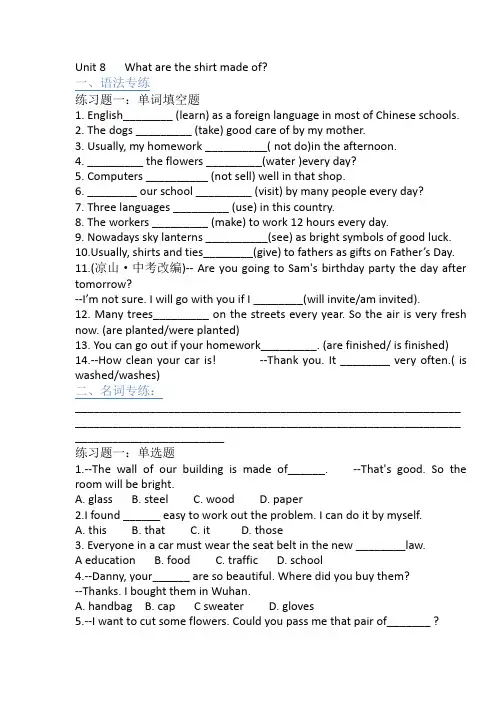
Unit 8 What are the shirt made of?一、语法专练练习题一:单词填空题1. English________ (learn) as a foreign language in most of Chinese schools.2. The dogs _________ (take) good care of by my mother.3. Usually, my homework __________( not do)in the afternoon.4. _________ the flowers _________(water )every day?5. Computers __________ (not sell) well in that shop.6. ________ our school _________ (visit) by many people every day?7. Three languages _________ (use) in this country.8. The workers _________ (make) to work 12 hours every day.9. Nowadays sky lanterns __________(see) as bright symbols of good luck.ually, shirts and ties________(give) to fathers as gifts on Father’s Day.11.(凉山·中考改编)-- Are you going to Sam's birthday party the day after tomorrow?--I’m not sure. I will go with you if I ________(will invite/am invited).12. Many trees_________ on the streets every year. So the air is very fresh now. (are planted/were planted)13. You can go out if your homework_________. (are finished/ is finished)14.--How clean your car is! --Thank you. It ________ very often.( is washed/washes)二、名词专练:______________________________________________________________ ______________________________________________________________ ________________________练习题一:单选题1.--The wall of our building is made of______. --That's good. So the room will be bright.A. glassB. steelC. woodD. paper2.I found ______ easy to work out the problem. I can do it by myself.A. thisB. thatC. itD. those3. Everyone in a car must wear the seat belt in the new ________law.A education B. food C. traffic D. school4.--Danny, your______ are so beautiful. Where did you buy them?--Thanks. I bought them in Wuhan.A. handbagB. cap C sweater D. gloves5.--I want to cut some flowers. Could you pass me that pair of_______ ?--OK. Here you are. Be careful not to cut yourself when you use it.A. shoes B chopsticks C scissors D. trousers6. Put on your _______, or you may make your hands dirty.A. coatB. socksC. hatD. gloves7.--Why are you so late today?--Because the ______ was so heavy, I spent about two hours driving here. A. line B road C situation D traffic练习题二:单词填空题1.Now China is getting better at making high-technology p________ and people can buy them in many parts of the world.2. Look at the camera, Sir. It is our new _______(produce).3. You need to put some c_______ into the ticket machine(自动售票机) to get the ticket to the subway.4. The ring is made of s________.5. These_________(leaf) turn yellow in autumn.6. Alice has lived in China for many years and she's been used to using ________(chopstick).7. The foreigners need to use knives and f_____ when they eat beef.8. He wants to go to F______ to learn French.9. On Emma's birthday, she got two pretty h______ from Aunt Lee.10.Li Mi ng’s parents are both ________(postman).11.Mary was born in a small town in_________(German).12. Ma Yun is one of the most famous ________(boss) in China.13. I want to buy a pair of blue _______(glove) for my son.14. The kite f______ was so exciting that the visitors couldn't help cheering.15. Where is your family going on a v_________, Laura?16. For the past five years, I have been a________(compete) of Wang Huan.17.The b_________ can fly up to the sky without being controlled. Because it is light.18. I need a pair of s_______ to make paper flowers.19. Little Red Riding Hood is a classic fairy t_________.20. People can't stand the h_______ in the sun in summer.21. The spaceships have been to the moon's s_________. For example, Chang e-3 landed on the moon in 2013.三、动词专练:______________________________________________________________ ______________________________________________________________________________________练习题一:单选题1.--Can you tell me how tea is_______? --Sorry, I don't know, either.A. drinkB. produceC. makeD. produced2. Rice_____ by hand in many countries, such as China and India.A growsB is grown C. grown D. grew3.--Your skirt feels so soft. --Yes. It ______silk.A is made fromB is made of C. makes from D. makes4.--What are you _____so many books for, Grandma?--I'll give them away to the kids in West China.A. packingB. puttingC. gettingD. making5. Many trees and flowers _______ in our city every year.A plantedB are plantedC were plantedD plants6.--Good news! Self-driving cars will come into use in one or two years.--Really? We're expecting to see how they ________.A are makingB are madeC make D. will make7. The scarf which is ______ silk ______ soft and comfortable.A. made from; feelsB. made of: feelsC. made in: smellsD. made up of; smells8. Hurry up! Once the concert starts, nobody ____ to enter the concert hall.A allowsB allowedC is allowedD is allowing9. Now students in some schools ________ not to use mobile phones.A askB askedC are askedD were asked10. I can’t _______ the work on time. I need your help.A. completeB. acceptC. admireD. require11. The table is so dirty. Why don't you ____ the table _____ a piece of cloth?A put; onB cover: with C. turn: into D. take: to12.The plane quickly ______ the air and disappeared slowly.A turned intoB covered with C. sent out D. rose into13.--When did you ______ the project? --Yesterday.A. produceB. completeC. suggestD. discover14.The factory near my house can ______ 2. 000 cars every month.A produceB acceptC leadD invent练习题二:单词填空题1. These new types of energy cost very little and p________ little pollution.2. The factory _________(produce) two thousand lamps every week.3. TFBOYS are__________(know) to teenagers in China.4. Be careful next time. You should a_______ the similar mistakes later on.5. English ________(speak) in America.6. I wonder what you t _______ about Weifang Kite Festival now.7. The picture was p ______ by a famous artist Van Gogh(梵高).8. A big sports meet________(hold) in our school in May every year.9. This kind of camera ________(make) in Japan.10. Some paper was _________(cut) into flowers, animals and so on with scissors.11. The sky lanterns are often ________(light) when we have some important festivals.12. His homework was c________ just now. He can have a rest now.13.A lot of land is c_______ with sand.四、用法专练:练习题一:单选题1. You can hardly avoid ________ her if you work in the same office.A. hidingB. meeting C to hide D to meet2. I visit three stores before _______ a T-shirt.A buyB bought C. to buy D. buying3.--How can I learn English well?--I think you should try _______ English every morning.A readB to readC readsD to reading4.--I will travel to Mount Tai. Could you tell me something about it?-Let me help you _______ the information about it.A. finds B found C. find out D. looked for5. The math problem is so hard. I really don’t know_______.A. how to do it B how to do C. what to do it D. what do it练习题二:单词填空题1. I don’t know why Jane al ways avoids ________(talk) to me these days.2. That boy is so good at ________(play) the piano.3. Children under 18 aren't allowed _______(watch) this show.4. This work is very important. You should try _________(finish)it.5. Linda hasn't learned how ________(make) dumplings yet.6. We have completed__________(listen) to the English tape.五、形容词副词专练:______________________________________________________________ ______________________________________________________________________________________练习题一:单选题1. Wang Bin is a _______ young man. He always takes an active part in all kinds of activities.A. dangerousB. politeC. lively D lonely2.-- Our English teacher always keeps his lessons ______.--That’s wh y he is so popular among his students.A livelyB happilyC freelyD friendly练习题二:单词填空题1. Nowadays WeChat is ________(wide) used in our daily life.2. The I_______ people there are friendly to the tourists.3. I find it ________(interest) that I have a conversation with my pen pal in English.4. We like singing the i_________ song.5. His I________ imagination(想象力) made all the people in the hall very surprised.6. Miss Li's classes are ______(live). Her students like her classes very much.7. Xi Jinping is going to attend(出席)an i_________ meeting.8. Some __________(internation) meetings are held in our city every year.六、介词连词专练:练习题一:单选题1.___where you go in life or how old you get, there's always something new to learn about.A. What elseB. HoweverC. No matterD. As long as2. --Is your kite made ______ your father? --Yes, and it looks like a plane.A by B. of C. with D. to3.Children often paint pictures _______ colorful crayons.A. with B, in C. by D on4. The clay pieces are fired ______ a very high heat after they are dried.A. onB. inC. toD. at5. I'll finish the job, ______ how long it takes.A. untilB. unlessC. no matter D even though七、阅读专练:练习题一:动词填空题Weifang international Kite Festival ________(hold) from 20th to 25th April every year, the Festival is an international a kite grand _______( meet) heldin Weifang, Shandong once a year, which attracts thousands of _________(compete), kite experts, fans and visitors.The kingdom of kite in China-Weifang, Shandong is ________( know) all over the world because the kite sports are held here every year since 1984. During the International Kite Festival, the Weifang city _______( decorate) with lanterns and ________(color) streamers, the whole city is full of joy like in the Lantern Festival. On April 21st, the kite match ________( hold)on the Fuyan Mountain or on the beach of the Bohai Sea. The day is the time that the kite stagers show their technology in front of _________(hundred) of visitors. You can see every colorful kite is ________( wave) in the wind and __________(fly) up and down in the blue sky.练习题二:综合填空题What is creativity?(1)Creativity can help make something that didn't exist(存在) before coming into being. We can show our creativity in many w_________. We can invent something or c________ the way in which someone else looks at something. In fact, all of us can be c________ every day, because we k_______ changing our ideas about the things around us. Creativity isn't just about d_________something that is new to the world; it is more about something that is new to o________. As we change ourselves, the world changes w________ us. What is creative thinking? Creative thinking is the process that we use when we come up with a new idea. Brainstorming(集思广益) is one form of creative thinking. It w_________ by merging((结合) someone else’s ideas with your own to c________ a new one. The process of creative thinking can be accidental or deliberate(故意的).So something can be invented by people by a_______ when they suddenly have new ideas.(2)Most people have flown a kite. It makes people happy. It's easy to make it. It's made o_________ bamboo and paper, but not so many people know that kites were first made in China t_____ of years ago. The ancient Chinese made and f________ kites even before they could write.A long time ago, the Chinese made kites to use in wars. They would fly these war kites in the dark. The kites were fixed(固定) and they made strange s________ in wind. Men who were at war a_______ them would hear these sounds and run away. They thought those strange sounds were made by dogs in the s_________.The ancient Chinese also flew kites to bring good l_____ and to make theircrops grow rich and tall. Sometimes they tied long strings and hooks(钩子)to their kites. Then they would fly the kites o_______ water, letting the hooks hang down to catch fish.The Chinese u_______ sticks, string and paper for their kites. Some of these kites I_______ like animals or trees and others look like houses.。

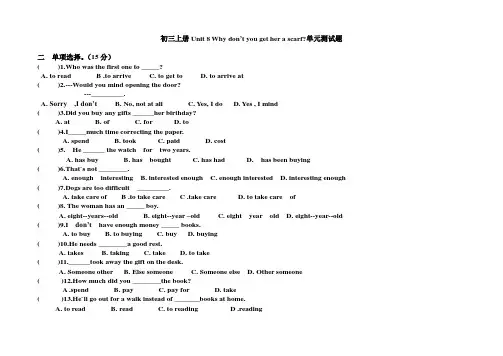
初三上册Unit 8 Why don’t you get her a scarf?单元测试题二单项选择。
(15分)( )1.Who was the first one to _____?A. to read B .to arrive C. to get to D. to arrive at( )2.---Would you mind opening the door?---_________.A. Sorry ,I don’tB. No, not at allC. Yes, I doD. Yes , I mind( )3.Did you buy any gifts ______her birthday?A. atB. ofC. forD. to( )4.I_____much time correcting the paper.A. spendB. tookC. paidD. cost( )5. He ______ the watch for two years.A. has buyB. has boughtC. has hadD. has been buying( )6.That`s not ________.A. enough interestingB. interested enoughC. enough interestedD. interesting enough ( )7.Dogs are too difficult _________.A. take care of B .to take care C .take care D. to take care of( )8. The woman has an _____ boy.A. eight--years--oldB. eight--year –oldC. eight year oldD. eight--year--old ( )9.I don’t have enough money _____ books.A. to buyB. to buyingC. buyD. buying( )10.He needs ________a good rest.A. takesB. takingC. takeD. to take( )11.______took away the gift on the desk.A. Someone otherB. Else someoneC. Someone elseD. Other someone( )12.How much did you ________the book?A .spend B. pay C. pay for D. take( )13.He`ll go out for a walk instead of _______books at home.A. to readB. readC. to reading D .reading( )14.The preasant is ______expensive for me_______.A. too, to buy itB. too, to buy C .so, to buy D .so, to buy it( )15.There are _______gifts for her birthday . Her friend spent ________ money.A. too much , too many B .too many , too much C. much too , too much D. many too , too many三阅读理解。
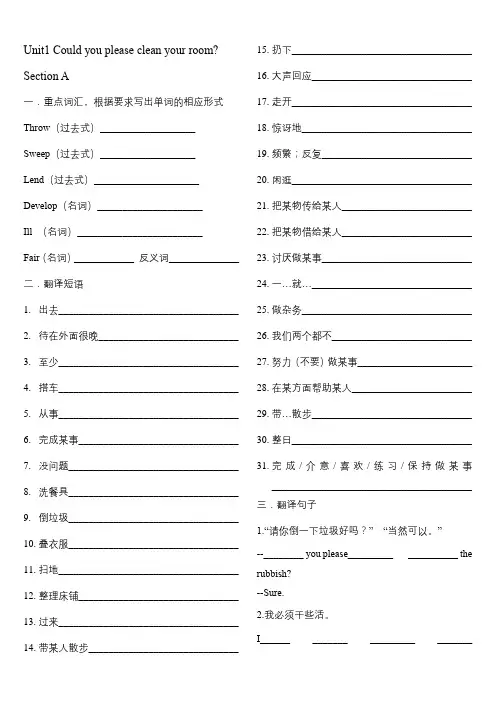
Unit1 Could you please clean your room? Section A一.重点词汇,根据要求写出单词的相应形式Throw(过去式)___________________Sweep(过去式)___________________Lend(过去式)_____________________ Develop(名词)_____________________Ill (名词)_________________________Fair(名词)____________ 反义词______________二.翻译短语1.出去____________________________________2.待在外面很晚____________________________3.至少____________________________________4.搭车____________________________________5.从事____________________________________6.完成某事________________________________7.没问题__________________________________8.洗餐具__________________________________9.倒垃圾__________________________________10.叠衣服__________________________________11.扫地____________________________________12.整理床铺________________________________13.过来____________________________________14.带某人散步______________________________15.扔下____________________________________16.大声回应________________________________17.走开____________________________________18.惊讶地__________________________________19.频繁;反复______________________________20.闲逛____________________________________21.把某物传给某人__________________________22.把某物借给某人__________________________23.讨厌做某事______________________________24.一…就…________________________________25.做杂务__________________________________26.我们两个都不____________________________27.努力(不要)做某事_______________________28.在某方面帮助某人________________________29.带…散步________________________________30.整日____________________________________31.完成/介意/喜欢/练习/保持做某事________________________________________三.翻译句子1.“请你倒一下垃圾好吗?” “当然可以。
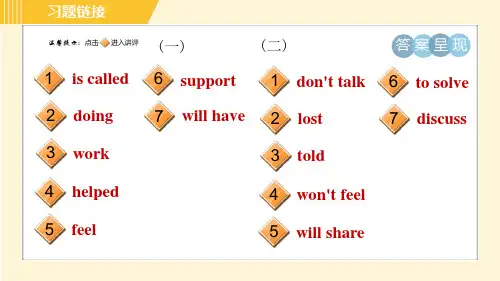
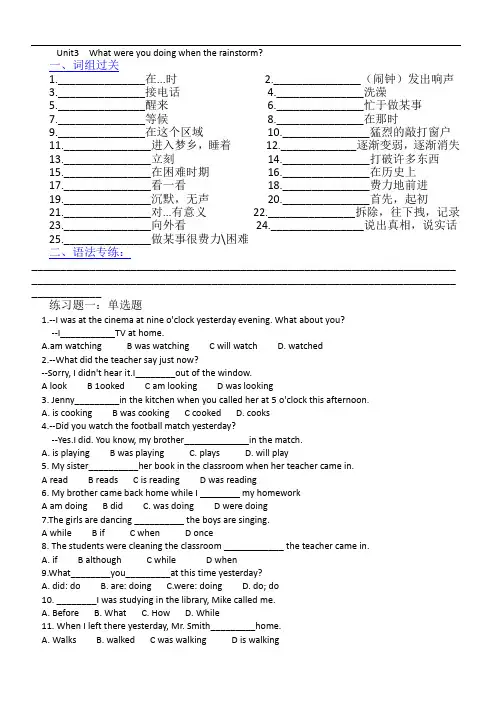
Unit3 What were you doing when the rainstorm?一、词组过关1._______________在...时2._______________(闹钟)发出响声3._______________接电话4._______________洗澡5._______________醒来6._______________忙于做某事7._______________等候8._______________在那时9._______________在这个区域10._______________猛烈的敲打窗户11._______________进入梦乡,睡着12._____________逐渐变弱,逐渐消失13._______________立刻14._______________打破许多东西15._______________在困难时期16._______________在历史上17._______________看一看18._______________费力地前进19._______________沉默,无声20._______________首先,起初21._______________对...有意义22._______________拆除,往下拽,记录23._______________向外看24.________________说出真相,说实话25._______________做某事很费力\困难二、语法专练:_________________________________________________________________________ _________________________________________________________________________ ____________练习题一:单选题1.--I was at the cinema at nine o'clock yesterday evening. What about you?--I___________TV at home.A.am watching B was watching C will watch D. watched2.--What did the teacher say just now?--Sorry, I didn't hear it.I________out of the window.A lookB 1ookedC am lookingD was looking3. Jenny_________in the kitchen when you called her at 5 o'clock this afternoon.A. is cooking B was cooking C cooked D. cooks4.--Did you watch the football match yesterday?--Yes.I did. You know, my brother_____________in the match.A. is playing B was playing C. plays D. will play5. My sister__________her book in the classroom when her teacher came in.A readB readsC is readingD was reading6. My brother came back home while I ________ my homeworkA am doingB did C. was doing D were doing7.The girls are dancing __________ the boys are singing.A whileB ifC whenD once8. The students were cleaning the classroom ____________ the teacher came in.A. if B although C while D when9.What________you_________at this time yesterday?A. did: doB. are: doingC.were: doingD. do; do10. ________I was studying in the library, Mike called me.A. BeforeB. WhatC. HowD. While11. When I left there yesterday, Mr. Smith_________home.A. WalksB. walked C was walking D is walking练习题二:单词填空题1.We___________(wash )our clothes at six yesterday evening.2. While Ann____________(talk) with her deskmate, the teacher came in.3. Look! Mary______________(clean) the room.4. What____________(happen) in the shop while you were at the park?5.They___________(move) to Paris last month.6. He_____________( read)a novel from 8 to 12 yesterday morning.7. What__________he___________(do) at five o'clock yesterday afternoon?8. He______________(watch)TV when I came in.9. She_____________(do) her homework while her mother___________(cook).10. What were you doing when you______________( hear)the news.11. Peter ____________(play) the piano at eight o'clock12. While you were walking along the street, we __________( wait) for the bus.13.I________(read) a novel last night when I heard knocks at the door.14. When I got home yesterday afternoon, it____________(rain) heavily.15.--Every student in our class was at the meeting except you. Why?--Sorry, sir. Mrs. Wang___________(explain) a math problem to me.16. When I got home, my pet dot__________(lie) on the sofa.17. The Greens_______(watch) TV at this time last night.18.My son was playing chess while my daughter ________(talk) with her teacher.三、名词专练:_________________________________________________________________________ _________________________________________________________________________ ____________练习题一:单选题1.I tried several jackets on, but ________ of them looked good.A.BothB. eitherC. noneD. neither练习题二:单词填空题1. My a________ didn't go off this morning so I got up late.2. After the r__________, there were pools on the roads.3. If you look out of the w________, you will see the garden.4.Ben’s mom put some m_________(match) on the table.5.The I_________in the room is poor, so I can't see anything clearly.6.These desks and chairs are made of w__________.7.The only I_________in her room is coming from this small window.8.I don't think the information in the r___________is true.9.--How can people make a living in this poor a_________.--Most of them plant apple trees and vegetables.10.Do you bring m________with you? I want to make a fire.11.Lily practices singing every day. She has an important music c___________ next week. She wants to win.12.The biggest e_________ in China in 2008 was Peking Olympics Games. I was so proud of it.13.--Is Professor Johnson giving a r__________ in the hall?--No, it can’t be him. He has gone to Japan.14.I hope you don’t mind my opening the w__________.15.She sat there in s___________ with tears in her eyes.16.What do you think of the basketball m_________ last night?17.T o tell the t__________, I don’t agree to your plan.18.There are several __________(pupil) in the classroom.19.They often play games in the p__________ after class.20.I was doing my homework when the door b________ rang.21.He was sad and went home in s_________ alone.22.Can you tell me the m_________ of the world? I can’t understand it.23.If he comes, I will tell him the t_________(true).24.I want to be a___________(report) like my uncle when I grow up.四、动词专练:_________________________________________________________________________ _________________________________________________________________________ ____________练习题一:单选题1.--Why were you late for school yesterday?--Because my alarm didn't____________.A.go off B go out C. sing D go over2.After the heavy storm, the lake______, and the water ran into the houses.A.roseB. comparedC.openedD.decided3.--Who________the basketball game?--We did. We_______ the team of No. 2 Middle School.A. beat: beat B beat: won C. won beat D. won: won4.--I called you at half past nine this morning. But there was no answer.--Oh, sorry, I________with my mother in the supermarket.A shopB was shoppingC shopped D. will shop5.--I was doing my homework at 11 o'clock last night.--So late? You are___________!A.SleepingB. waitingC. kiddingD. shopping6.Today, more and more people begin to ________ the importance of saving water.A. RealizeB. wasteC. controlD. cause7.--The little boy often________ his dictionary at school.--He is too careless.A.ForgetsB. leavesC.sellsD. buys1.--Why didn’t you go to play football with us yesterday afternoon?--I________ my mother with the housework then.A.HelpedB.was helpingC. am helpingD. help8.Cathy called Jim twice yesterday afternoon, but nobody__________.A picked upB put up C. got up D. woke up9.I was late for school. Because my alarm didn't___________.A turn offB go off C. cut off D. put off练习题二:单词填空题1.I got up late this morning, so I ___________(arrive) late for school.2.Lisa and her sister __________( be) in the clothes store at that time.3.I called you at eight and you didn’t a__________.st night the TV news r__________ that serious accident.5.The price of houses in the city________(rise) last mouth.6.Early in the morning, few people w_________ for a bus.7.--Can you tell me how the train accident h___________?--It was too terrible to believe!8.Mary ________(dance) while her sister ___________(sing) at that time.9.__________ you still___________(read) that magazine at eight last night?10.-- What is his friend doing?--Oh, he _________(call) the Animal Helpline.11.Could you tell me what _________(happen) outside the park just now?12.________ your cousin __________(draw) a picture when you came in?13.--I h________ the news Just two hours ago.--Me too.13.Dr. Martin Luther King was m___________ on April 4,1968.14.The shop c___________ on weekends. It only opens from Monday to Friday.15.--I failed the math exam.--You are _________(kid).You got first place last term.五、用法专练:_________________________________________________________________________ ______练习题一:单选题1.--I have some trouble________physics. Could you help me?--No problem.A. learningB.learned C learn D to learn练习题二:单词填空题1.Listen! There is someone ___________(beat) the door.六、形容词、副词专练:_________________________________________________________________________ _________________________________________________________________________ ____________练习题一:单选题1. It was raining___________ when my sister and I got to the museum.A badlyB softlyC hardlyD heavily2. My mother was so tired that she fell_________ when watching TV.A sleptB sleepingC asleepD sleep3.Mr. Green fell over on the ice, but________didn’t hurt himself.A luckB luckyC unlucky D. luckily4.--Where were the kids about half an hour ________?-- They were in the library.A beforeB soonC ago D. later5.Be careful when you drive on the__________ roads.A. SunnyB.icy C windy D cloudy练习题二:单词填空题1. It's raining_________( heavy )outside. You had better take an umbrella with you.2.S___________, it started to rain and all the people in the street got wet.3.He’s a smart boy and he often asks me many s____________ questions.4.Where is the __________(break) cup, Jimmy?5.The radio says that is will be________(wind) tomorrow.6.Hurry up! Or you’ll be l_________ for school.7. We s__________ heard somebody calling for help in the forest.8.Look! The ________(fall) tree is lying across the road.9.Be careful, please! The street is _______(ice).10.Planes are one of the most important transportations in the m__________ world.11. --What a b_________ sunny day is it!-- Let’s go hiking together.12.The old man ___________(sudden) fell down on the ground when he was walking.七、介词、连词专练:_________________________________________________________________________ ______练习题一:单选题1.(易错题) The rain beat______her face as she walked through the wind and rain.A atB againstC inD from2.__________Helen was walking on the street. she met her math teacher Mr. Lee.A. WhileB. BeforeC. AfterD. Until3.The school bus is moving slowly_________the icy road.A because B. because of C. as D. for4.We should help each other_________difficulty.A on time ofB in time ofC on times of D. in times of5.--What were you doing at 9: 30 last Sunday morning?--I was helping my sister_______her homework.A. forB. atC. withD. about6. --Did you hear the good news _________ the radio?--Yes, we did.A.beforeB. onC. acrossD.between7.Mr. White was so careless that he hit _________ the tree.A at B. for C. against D. in8. I didn't understand what my teacher said__________, but later I got it.A at last B. at first C. at least D. in fact八、阅读专练:动词填空:Yesterday was a terrible day. My alarm 1_________(not go)off so I woke up late. It wasseventhirty when I 2__________(wake) up, and I needed 3__________(be) at school by eight! I ran to the bus stop ... But, I still missed the bus. It was eight thirty when I got to school. My teacher was angry and I 4__________( feel) bad all day.At four thirty it was time 5_________( go )home. I was waiting for the bus when... all of a sudden.. it began 6___________(rain) heavily. It was like... a really crazy rainstorm! I thought I had an umbrella in my schoolbag, so I kept 7________( try) to look for it. I was so busy 8_______( look) for the umbrella that I didn't see a car coming. And it got water all over me! I 9__________(wait)like pletely wet... for maybe almost an hour. Finally the bus came and brought me home. I took a hot shower and 10__________( eat) some warm food. It felt so good to be home.首字母填空:Mr. Brown was a kind person. He liked to take a walk after breakfast.It was a cold winter morning. Mr. Brown was w_________along the street when he heard a cry for help. He turned around b________ could not see anybody. He stopped and looked here and there. At that moment, a boy ran up to him. The boy was in such a hurry t_________ he couldn't say a word but pointed towards the river, Mr Brown ran to the river as soon as p_________.Both of them ran along the river and saw a girl in the water. She was holding a p__________ of wood. It was carrying her away. It was too dangerous. W_______ saying a word, Mr. Brown took off his clothes as q__________ as he could and jumped into the river. He swam to the girl, took her back near the bank and lifted(举起) the girl up. The boy h___________ pull her out of the water. Then they stopped a car and took the girl tothe h__________. At last the girl was saved, and she thanked t__________ very much. What a kind man Mr. Brown was!阅读表达一:Many people were waiting for the train. 3. Some were reading newspapers, and some were saying goodbye to their friends. Dr. Wang, Mr. Li and Mr. Chen were talking so happily and excitedly that they did not the train was going to leave. Then the guard called loudly, "The train is going to leave. Hurry up, please.” The three men heard the call and two of them jumped on thetrain quickly before it moved. One was left behind.It was Dr. Wang. He looked very sad. The guard came to him and said, "Don't feel sad. The next train will come in ten minutes. ""I know, "Dr Wang said. "But it was my train.” 4. My friends only came to see me off.A.根据短文内容回答下列问题。
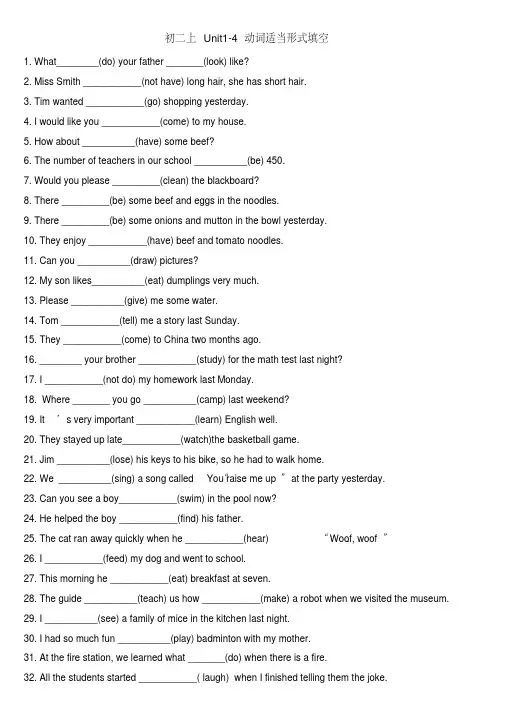
初二上Unit1-4动词适当形式填空1. What________(do) your father _______(look) like?2. Miss Smith ___________(not have) long hair, she has short hair.3. Tim wanted ___________(go) shopping yesterday.4. I would like you ___________(come) to my house.5. How about __________(have) some beef?6. The number of teachers in our school __________(be) 450.7. Would you please _________(clean) the blackboard?8. There _________(be) some beef and eggs in the noodles.9. There _________(be) some onions and mutton in the bowl yesterday.10. They enjoy ___________(have) beef and tomato noodles.11. Can you __________(draw) pictures?12. My son likes__________(eat) dumplings very much.13. Please __________(give) me some water.14. Tom ___________(tell) me a story last Sunday.15. They ___________(come) to China two months ago.16. ________ your brother ___________(study) for the math test last night?17. I ___________(not do) my homework last Monday.18. Where _______ you go __________(camp) last weekend?19. It’s very important ___________(learn) English well.20. They stayed up late___________(watch)the basketball game.21. Jim __________(lose) his keys to his bike, so he had to walk home.You raise me up”at the party yesterday.22. We __________(sing) a song called“23. Can you see a boy___________(swim) in the pool now?24. He helped the boy ___________(find) his father..25. The cat ran away quickly when he ___________(hear) “Woof, woof”26. I ___________(feed) my dog and went to school.27. This morning he ___________(eat) breakfast at seven.28. The guide __________(teach) us how ___________(make) a robot when we visited the museum.29. I __________(see) a family of mice in the kitchen last night.30. I had so much fun __________(play) badminton with my mother.31. At the fire station, we learned what _______(do) when there is a fire.32. All the students started ___________( laugh) when I finished telling them the joke.33.Be quiet, please. The baby _________(sleep).34. That ______ (sound) like a good idea.35. Lucy is good at ______ (dance)句型转换1.He is really tall. (划线提问)_________ __________ he _________ _________?2.They are tall.(用short 改为选择疑问句)________________________________________?3.Mike wears glasses.(改为否定句) Mike ______ ________ glasses .4. The boy has short brown hair.(改为同义句) He is ________ _______ ______ short hair.5. He has short hair .(用long改为选择疑问句)____________________________________ ?6.He wants to go shopping.(改为同义句)He _______ ________ to go shopping.7.I’d like a large bowl of noodles.(划线提问)________ _______ bowl of noodles would you like?8.The girl would like chicken and cabbage noodles.(划线提问)______ ______ _______ noodles would the girl like?9.I’d like to go to the movie.(划线提问) _______ ________ you like _______ ________?10.I’d like some tomatoes.(改为一般疑问句)________ you like _________ tomatoes?11.She got up late last weekend.(划线提问)_________ _________ she ________ up late?12.I did my homework. (改为一般疑问句) ________ ________ ________ to the mountains?13.He had great fun today. (改为否定句) He ________ ________ great fun today.14.I went to New York City. (划线提问) ________ _______ you ________?15.He played football yesterday. (划线提问) _______ ________ he ________ yesterday ?16.The beaches were beautiful. (划线提问) _______ ________ the beaches?17.The boy went to the park with his friend. (划线提问)______ _______ the boy ________ to the park _______?书面表达根据提示写一篇游记。
初三上册unit 5 If you go to the party, you’ll have a great time!单元测试题二、选择填空(共15小题, 计15分)()1. We’ll go to the Summer Palace _____ it doesn’t rain this Saturday.A. whenB. ifC. untilD. because()2. He will do better in English if he ________ harder.A. will workB. worksC. workingD. work()3. I’m going to ______ time with my grandparents this vacation.A. takeB. haveC. spendD. go()4. This book isn’t useful. Please _______.A. take part inB. take it awayC. take away itD. take it out()5.If you become a famous soccer player, you’ll make money.A. manyB. a lot ofC. lot ofD. little()6. What ____ you ______ at eight yesterday evening?A. have, doneB. did, doC. were, doingD. will, do()7. They found ______ they are famous for only a short time.A. itB. thisC. thatD. them()8. Could you please _________ me the way to the hospital.A. showingB. showedC. showD. shown()9. __________ is a good chance __________ them to go abroad.A. This,forB. It,ofC. It,forD. That,of()10. -What are you going to do tomorrow?-______.A. Nothing muchB. Much nothingC. Not anythingD. No thing11.When I ________ her in the hall, she was playing the piano.A. seeB. sawC. will seeD. am seeing12.If the rain , we’ll have to stay at home.A. doesn’t stopB. won’t stopC. hasn’t stoppedD. don’t stop13.Look at Lana’s report card.Math English Geographycan do better good at listening not hard-working -What did Lana’s geography teacher say? -He said Lana was .A. hard-workingB. athleticC. uglyD. lazy14.Don’t ________ jeans to the party.A. put onB. wearC. wearingD. dress15.-What if we the party tomorrow ?-I think half the class won’t come.A will happen; will have B. happen; will have C. will happen; have D. happen; have三、阅读理解(共四篇短文,20小题,计20分)先阅读短文,然后根据短文内容从文后每小题的四个选项中,选出一个能完成所给句子或回答所提问题的最佳答案。
用所给词的的正确形式填空。
1. My father enjoys __________ (live) in the small town.2. If it _______ (not rain) tomorrow, we’ll have a picnic.3. I’d like _________ (start) a snow globe collectors’ club.4. If you wear jeans, the teacher ________(not let) you in.5. If she _________ (be) free, she will come and help me.6. The teacher ______(take)away my mobile phone because I used it in class.7. The little boy made a ________ (live) by selling flowers.8. They made me _______ (feel) very sad.9. What ___________ (happen) if I do that?10. My sister wants to be a ________ (law) in the future.11. I saw my grandmother on my ( ten)birthday .12. Why not (get) a scarf?13. Connie is the ( tall)girl I have ever seen.14. The dog’s death made her (sad).15.I like the blue one,but it’s much (expensive)than the red one.16.The boy (name) Tom is Lucy’s brother.17.I fell (sleep) last night while I was watching TV.18 .That is the nicest stamp that I ever (see).19. (play) basketball often (make) me excited.20 .people over there are (friend) to others.21. You’d better _________________(wash) the dish after dinner.22. Could you please ________________(feed) the dog?23. _________________ (drop) litter is not allowed in the park.24. This box is too big, I want ________________( get) a small one25. Would you mind___________________(open) the window?26. Would you mind _____________________________(not smoke)here?27. May I __________________(use) your ruler? I left mine at home28. I don’t like _________________(wear) the old jeans.29. Why not________________(go) to the school party.30. You have to_______________(study) hard to get good grade31. What a _______________ (luck) guy he is!32. The boy _______________ (name) Tom is Lucy's brother.33. I fell ________________ (sleep) last night while I was watchingTV.34. I don't have enough time _____________ (spend) with him.35. Parents usually spend some money ________________ (buy)books for their kids as gifts.36. Cats can catch ______________ (mouse).37. ________________ (take) care of the patients is her job.38. Reading English in the morning is a good way_______________ (learn) English.39. That's the nicest stamp I ____________________ (see) until now.40. Why not _______________ (turn) on the TV41. If she ____________ (walk) to the factory, she’ll be late.42. If he likes it, he____________ (read) it soon.43. Did they have fun ____________ (dance) at the school party?44. Half of the books in the library ____________ (be) new.45. —Who ran fastest in the men’s 100-meter race? —LiPing______________ (do).46. For a five-year-old kid, he/she will have a difficult time_______________ (understand) the book.47. We don’t know if it _____________ (snow).48.—How long __________ your father________ (work) in the factory? —Since he ___________ (leave) college.49.How long __________ you __________ (listen) to music last night?50. When ____________you ________ (attend) the after-school club?51. He is always the first one _______ (arrive) at school and thelast ______ (leave) school.。
动词填空专练(1)用括号内所给动词的适当形式填空,必要时可加助动词或情态动词。
Everybody1.(know)the famous building—the Eiffel Tower,which was built in Paris,France,in1889.The tower is324meters high,and it2.(be)the highest building in the world until1930,when the Chrysler Building in New York appeared.Today the Eiffel3.(visit)by more tourists than any other historic building in the world,but it wasn’t always so popular.When it was first finished,many people 4.(think)it was ugly.One famous writer used to5.(have)lunch in the Eiffel Tower every day because it was the only place in Paris where he could not see the tower! About six million people visit the Eiffel Tower every year.Many of them6.(take) one of the five lifts to the top,but some choose7.(climb)up the1,665steps.The tower8.(have)two restaurants where people can enjoy delicious food.And people can watch the fantastic view of the city while they9.(eat).The tower also has a shop where people10.(buy)gifts for friends and families.(2)用括号内所给动词的适当形式填空,必要时可加助动词或情态动词。
一、选择题1.--Which is your teacher?--The one thick(厚厚的)glasses over his eyes is.A.wears B.wear C.with D.has C解析:C【解析】句意:——哪一个是你的老师?——戴着厚厚的眼镜的那个。
答句中已有谓语动词is,所以此空不需要谓语动词,A、B和D项都可以作谓语动词,with是介词,表示伴随状态,意为“带着、拥有”等意思,和后面的内容构成介词短语作后置定语;故答案选C。
2.Which of the following(下面) is right?A.The boy begin to clean the room with his sister.B.In the Spring Festival, the children often get lucky money.C.How is weather like in spring there?D.You’d better not read a book in the sun.D解析:D【解析】【详解】句意:下面那一项是正确的?考查判断句子正误。
A项中主语“The boy”是第三人称单数,谓语动词要用第三人称单数形式begins;B项中由“the children often get lucky money”可知,这里的孩子们不用特指。
而不用the;C项中weather特指“那个地方春季的天气”,其前要用定冠词the,且用How提问时其后不用like;D项你最好不要在阳光下看书。
had better +do最好做某事,在阳光下in the sun正确。
故选D。
3.(2016●泰州市) --As a nurse, her work goes taking care of her patients.--Yes, she always thinks of others.A.beyond B.beside C.behind D.between A解析:A【解析】【分析】【详解】句意:——作为护士,她的工作超出了照顾病人的范畴。
一、选择题1.My teacher runs ______ the morning. But he doesn't run ______ Sunday morning. A.in;on B.on;in C.in;in D.on;on A解析:A【解析】【分析】【详解】句意:我的老师早上跑步。
但是他在周日的早上不跑步。
考查介词。
in作为时间介词时,后面跟不具体的时间,例如某年或某月这样的大范围时间或者用于in the morning、in the afternoon这样的固定搭配中;on作为时间介词时,后跟具体到某一天的时间。
前面的在早上应该用in the morning;第二空后是Sunday morning,是具体的时间,前面需要用介词on,故选A。
2.—Do you know the girl ________ red skirts?—Yes, she is my sister.A.at B.on C.in D.to C解析:C【解析】【分析】【详解】句意:——你知道穿红裙子的那个女孩吗?——是的,她是我的妹妹。
考查介词辨析。
at在……;on在……上;in穿,在……; to到……。
根据下文“Yes, she is my sister.”可知上文是“穿红裙子的那个女孩”,in red skirts表示“介词短语作后置定语”。
the girl in red skirts表示“穿红衣服的那个女孩”,根据题意,故选C。
3.The moonlight is shining in the window. Everything in the room looks so beautiful. A.over B.through C.across D.past B解析:B【解析】【分析】【详解】句意:月光正透过窗户照进来。
房间里的一切看起来非常漂亮。
本题考查介词辨析。
over在上方越过;through从中间穿过;across从表面穿过;past经过。
2009年英语练习题:用所给动词的适当形式填空
1. After school the students _______ (take) their bags and went home.
2. It often _______ (take) me half an hour _______ (get) to the post office.
3. _______ (be) your friends at school last week?
4. We will go to the movies if it _______ (not rain) tomorrow afternoon.
5. When we _______ (arrive) at the station, the train had already left.
6. Our P.E. teacher _______ (be) in the Party for ten years.
7. I’m sorry _______ (keep) you waiting for so long.
8. The heavy rain stopped us from _______ (go) swimming.
9. I didn’t know she preferred reading to _______ (play).
10. I _______ (put) my keys here just now. But I can’t find them now.
11. Li Lei _______ (carry) water for Aunt Mary at times.
12. Sue _______ (have) supper at half past six every day.
13. She _______ (go) to the cinema with her friends tomorrow evening.
14. Beth isn’t here. She _______ (go) to Beijing.
15. My mother _______ (do) some cooking when I came in.
【答案详解】
1. took。
and连接两个并列谓语,后一个动词用过去式,那么前一个动词也用过去式。
2. takes, to get。
根据句意“到邮局常花我半小时的时间”,可确定第一空用一般现在时,且主语是it,故动词用takes。
在句型It takes sb some time to do sth中,第二空用不定式to get。
3. Were。
由时间状语last week可确定此句用be的过去时,主语是your friends,为复数形式,故用were。
4. doesn’t rain。
在时间状语从句和条件状语从句中,如果主句为一般将来时,从句应用一般现在时代替一般将来时。
5. arrived。
从句意“当我们到达车站时,火车已经离开了”我们可知,主句用了过去完成时,那么从句则用一般过去时。
6. has been。
动作发生在过去,持续到现在,这是现在完成时的一种用法。
7. to keep。
在I’m sorry后常接不定式表原因。
8. going。
在stop sb from doing sth中,from为介词,那么动词go应用going。
9. playing。
根据句型prefer doing sth to doing sth,我们可知此空用动词的-ing形式。
10. put。
根据句意“我刚把钥匙放在这儿,但现在找不到了”,我们可确定前句用一般过去时。
put的过去时仍是put,无词形变化。
11. carries。
从句中的时间状语at times(有时),我们可确定此句的时态为一般现在时。
主语为单数第三人称,故动词carry变为carries。
12. has。
根据句意和时间状语every day,我们可知该句时态为一般现在时,且主语Sue为单数第三人称,所以have变为has。
13. will go。
根据句意和时间状语tomorrow evening,此句用一般将来时。
14. has gone。
句意为“Beth不在这儿,她去北京了”,如表示“到某地去了”,用have (has) gone to + 地点。
15. was doing。
句意为“当我进来时,妈妈在做饭”。
从句用一般过去时,主句应用过去进行时。